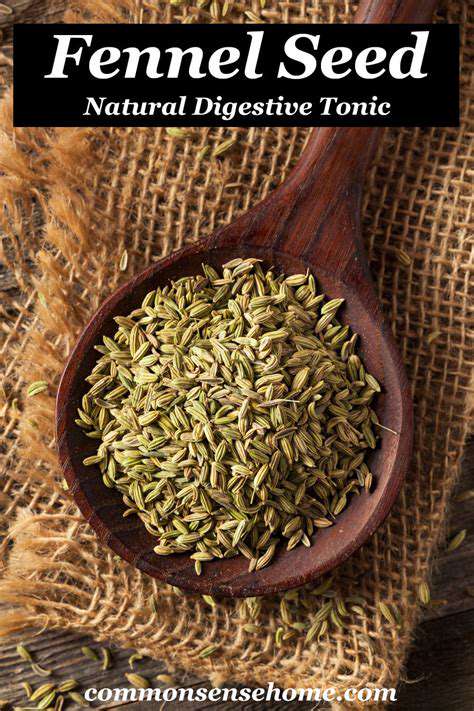Best Teas for Digestion and Gut Health

Fennel's Digestive Benefits
Fennel, a versatile herb with a slightly licorice-like flavor, has been used for centuries to support digestive health. Its effectiveness stems from a combination of compounds that promote healthy digestion and alleviate common digestive issues. This herb is particularly useful for those experiencing bloating, gas, or indigestion. Studies have shown that fennel can stimulate the production of digestive enzymes, which are crucial for breaking down food and absorbing nutrients properly.
The compound anethole, present in fennel, is known to have carminative properties. This means it helps to expel excess gas from the digestive tract, providing relief from discomfort. Fennel's soothing effects on the digestive system make it a valuable addition to a healthy lifestyle, especially for those with sensitive stomachs.
Culinary Uses and Versatility
Fennel's culinary versatility extends far beyond its digestive benefits. It can be incorporated into a wide array of dishes, from savory main courses to refreshing salads and flavorful soups. The bulbous root, the feathery fronds, and the seeds all offer unique flavors and textures. Its slightly sweet and anise-like flavor profile pairs well with many ingredients, making it a valuable addition to any kitchen.
From adding a zestful touch to roasted vegetables to infusing a unique aroma into stews, fennel's culinary applications are endless. Its versatility in both sweet and savory dishes makes it a truly remarkable ingredient.
Traditional Uses and Modern Research
Throughout history, fennel has been a popular remedy for digestive issues. Traditional healers recognized its potential to alleviate bloating, gas, and discomfort. Modern research has validated many of these traditional uses, demonstrating the scientific basis for fennel's effectiveness.
Recent studies have focused on the mechanisms by which fennel promotes digestive health. Researchers are exploring the specific compounds that contribute to its carminative and anti-inflammatory properties. This ongoing research further solidifies fennel's position as a valuable natural remedy for digestive support.
Potential Side Effects and Precautions
While generally safe, fennel may not be suitable for everyone. Individuals with known allergies to herbs or those taking certain medications should consult with a healthcare professional before incorporating fennel into their diet or using it as a supplement. If you experience any adverse reactions, such as an allergic response or digestive upset, discontinue use immediately and seek medical advice.
Dosage and Preparation Methods
The recommended dosage of fennel can vary depending on the form you choose to consume it in. Whether you're using fennel seeds, fresh fennel fronds, or a fennel supplement, it's crucial to follow the instructions carefully. Always prioritize consuming it according to the recommended dosage to maximize its benefits and minimize potential risks.
Fennel seeds can be easily incorporated into warm water or tea. Fresh fennel can be added to salads, soups, or roasted vegetables. Always ensure proper preparation methods to retain the herb's flavor and nutritional value.
Rooibos: A Gentle and Nutrient-Rich Choice
Rooibos and Digestive Health
Rooibos tea, known for its naturally sweet and subtly earthy flavor, offers a gentle yet effective approach to supporting digestive health. Unlike many other teas that contain tannins, rooibos is naturally caffeine-free, making it a soothing and easily digestible beverage for those seeking to promote a healthy gut environment. Its unique composition may help ease discomfort associated with occasional digestive issues.
The absence of tannins in rooibos means it's less likely to irritate the stomach lining, making it a suitable option for individuals with sensitive stomachs or those experiencing digestive distress. This gentler nature makes it a fantastic choice for promoting a calm and comfortable digestive experience.
Antioxidant Powerhouse
Rooibos boasts a significant concentration of antioxidants, which play a crucial role in protecting the body against cellular damage. These antioxidants, including various flavonoids, contribute to a healthy gut microbiome by supporting the growth of beneficial bacteria and inhibiting the proliferation of harmful ones. This protective action can contribute to overall digestive well-being.
Gentle on the Stomach
Rooibos's gentle nature makes it a valuable addition to a digestive health regimen. Its lack of caffeine and tannins minimizes the likelihood of stomach upset, making it a suitable choice for those with sensitive stomachs or those looking for a soothing beverage to promote relaxation and comfort during digestion.
Potential for Gut Microbiome Support
Studies suggest that certain compounds in rooibos tea may positively influence the gut microbiome. By supporting the growth of beneficial bacteria, rooibos could help maintain a balanced gut environment. This balanced environment is essential for optimal digestion and overall health.
Natural Sweetness and Flavor Profile
Rooibos tea's characteristic natural sweetness and mild, earthy flavor profile make it a pleasant and enjoyable beverage, even for those who might not typically enjoy bitter or strong-tasting teas. This palatable nature can encourage regular consumption, contributing to consistent support for digestive health.
Caffeine-Free Option
For individuals sensitive to caffeine or seeking a calming beverage, rooibos tea presents a caffeine-free alternative. Its absence of caffeine allows for consumption throughout the day without the potential for jitters or sleep disruption. This is particularly beneficial for those who prefer a soothing beverage that supports relaxation and digestion, without any stimulating effects.
Potential for Reduced Inflammation
Some studies suggest that rooibos's antioxidant properties may contribute to reducing inflammation in the body. Inflammation in the gut can negatively impact digestive processes. By reducing inflammation, rooibos could potentially improve overall digestive function and comfort.
Read more about Best Teas for Digestion and Gut Health
Hot Recommendations
-
*Guide to Managing Gout Through Diet
-
*Best Habits for Financial Well being
-
*How to Build a Routine for Better Mental Health
-
*How to Eat Healthy on a Budget [Tips & Meal Ideas]
-
*Guide to Practicing Self Acceptance
-
*How to Incorporate More Movement Into Your Day
-
*Guide to Managing Chronic Pain Naturally
-
*Guide to Building a Reading Habit for Well being
-
*Top 5 Weight Loss Supplements That Actually Work
-
*Best Exercises for Postpartum Recovery [Beyond Abdominal Work]




![Best Books on Mental Health and Well being [Recommended Reads]](/static/images/26/2025-05/CultivatingSelf-CompassionandPositiveSelf-Talk.jpg)






